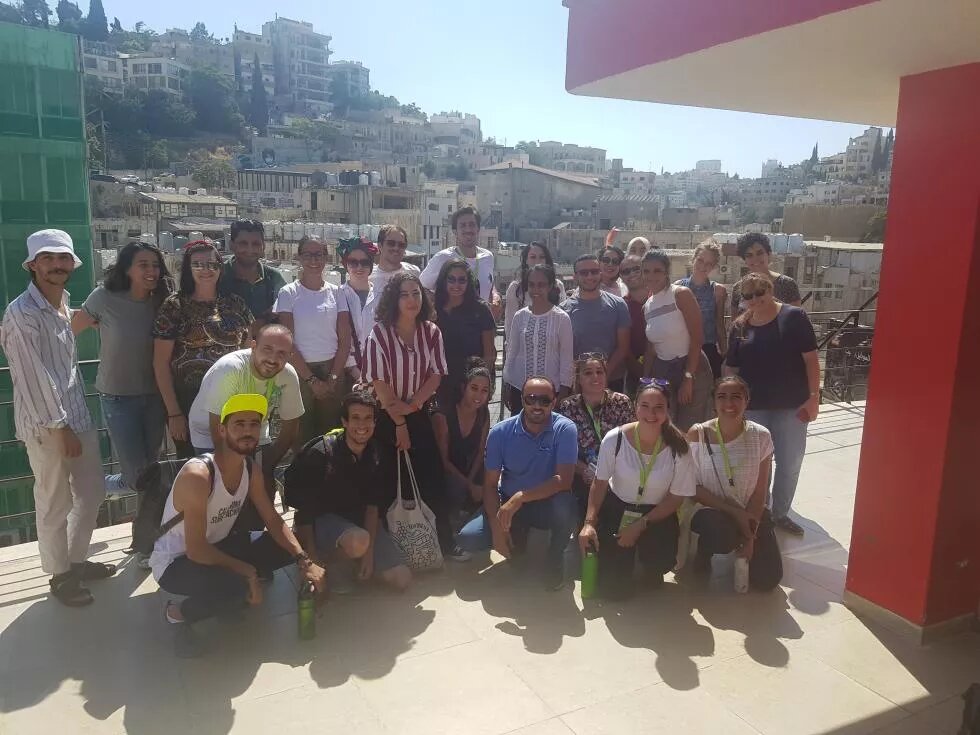
HBS offices in the MENA region held the 7th Regional Summer School in Amman, Jordan under the title “Our Cities Our Future: Civic Engagement in Urban Sustainable Development”. 23 activists, researchers, architects and civil society professionals from 8 Middle Eastern countries participated in the week-long School. They addressed various topics related to architecture and urban sustainable development. Through lectures, discussions, group work, and a field visit, the participants exchanged ideas, shared experiences and got the chance to meet and learn about inspiring initiatives working towards sustainable development in the region.
The major topics examined in the School were current urbanization trends in the MENA region, natural disasters preparedness, gentrification and housing rights, transportation systems and gender issues, shared public spaces, and artistic and environmental intervention in the urban space. Discussions focused on civic engagement as a driving force towards determining the future of the region’s cities, emphasizing environment and gender as central issues.
School speakers came from all over the region to shed light on urban challenges in their countries, efforts to create sustainable people-responsive frameworks, and aspirations for the future of our cities. Dr. Natasha Arouri (Palestine) kicked off the School sessions with a talk that examined urbanization within a neocolonial and neoliberal context, the concept of shock doctrine and the environmental impacts to our landscapes. She suggested radically rethinking our cities, their disaster preparedness and capacity for climate adaption. In her inspiring talk, she advocated for reconfiguring our urban spaces via community-led actions and civil society engagement that goes beyond structured development. Dr. Rami Daher (Jordan) addressed the participants on the critical linking between research, practice, public policy and implementation. He referenced a wide range of projects implemented in Jordan, including those concerned with the conservation and adaptive reuse of heritage buildings and sites. Hanna Salameh (Jordan), best known for his viral youtube videos on green architectural projects, shared his visions of sustainable and inclusive public spaces in Jordan. He presented his plan to create a public park in Amman and discussed with the participants the social and economic aspects of this idea. Faika Bejouai and Nadine Bekdache displayed their experiences in fighting for housing rights in their countries, Tunisia and Lebanon, respectively. They also led a group activity with the participants that had them revisit their own family housing histories, which interestingly reflected economic, social and political aspects connected to the MENA region. Hazem Zureiqat and Sahar Aloul of Jordan discussed transportation systems in Jordan, transportation and gender issues, and presented their own initiatives on the topic that may lead to improved, inclusive and environmentally friendly transportation systems in Amman. Meanwhile Rabee’ Zureiqat and Lama Khatieb from Zikra Intiative shared their special experience in community work focused of restoring confidence in local knowledge and the exchange of ideas between urban and rural Jordan for a sustainable way of living. Rabee’ is co-founder of the Bayt Al-Nai Project concerned with connecting young generations with their artistic legacy by teaching them to make and play the nai flute. He surprised our School participants by teaching them how to make a nai in less than 10 minutes, actually making one in front of them out of a simple plastic pipe he had brought along with him, and ended his talk by playing Arabic folkloric songs that resonated with our participants who started to sing along.
Mohcin El Akel from Morocco and Salma Kossementini from Tunisia chose to highlight artistic and cultural interventions in their home countries such as the Collective Museum of Casablanca and the INTERFERENCE International Light Art Project in the old Medina of Tunis, the latter giving a perspective of citizen’s engagement for art in the public space. On the topic of urban Agroecology, Bashar Zeitoon of Jordan addressed global food systems, their impacts on ecological resources, local economies and public health and how traditional knowledge has protected natural resources for food production. Abdallah Al-Khateeb and Ansar Jasim from the 15th Garden Initiative in Syria displayed the import role urban agriculture played in Yarmouk Camp during the civil war in Syria and the general significance of food sovereignty in times of conflict as an alternative to the humanitarian aid regime. Finally, Lina Ismai’l and Mustafa Hanoon shared their experiences with the growing Agroecology movement in Palestine, operating in the form of small grassroots groups, that are challenging conventional agricultural schemes and creating an alternative that aims for food sovereignty even under occupation.
The School was also an excellent platform for participants to network, exchange ideas, and share their experiences within their different contexts by presenting their own initiatives and projects on the topic of urban sustainable development. Some of the topics addressed by them were transportation, gender issues, housing rights, architectural heritage preservation, recycling, green energy projects, smart technology and smart cities, youth-led shared spaces and urban agroecology initiatives, among many others.
On the field visit day, participants put on their yellow fluorescent hats and made their way through the streets and alleyways of Amman, critically observing its contrasts, different neighborhood characteristics and issues. They enjoyed the hidden gems of artistic works spread out throughout the Jordanian capital as well as meeting initiatives along the way. The field trip was led by Afnan Barqawi and Zaid Souqi from the Orenda Tribe, an initiative working towards empowering youth through art and story-telling.
At the conclusion of the event, a farewell dinner was organized where participants had the chance to reflect on their experience, exchange contact information and express their heart felt goodbyes in hopes of meeting again in their common pursuits of more sustainable, democratic and inclusive MENA region.
































































